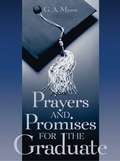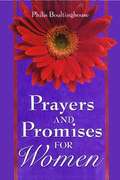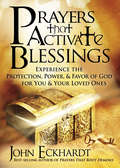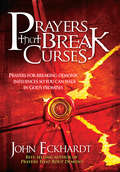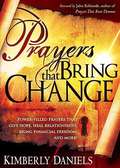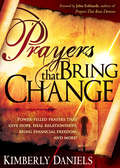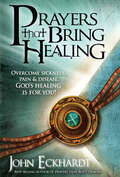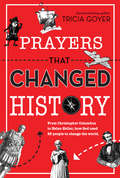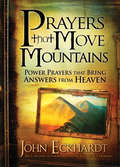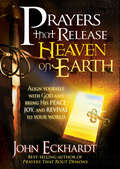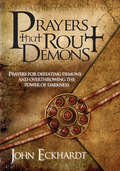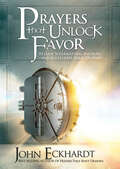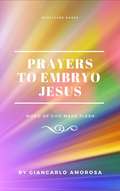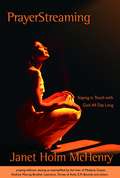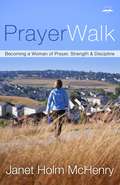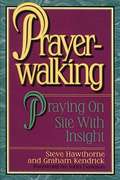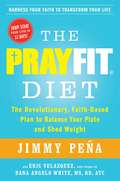- Table View
- List View
Prayers & Promises for Graduate GIFT
by G. A. MyersWhat could be more perfect for the special grad in your life than a book that would encourage as well as impact him or her spiritually? This uniquely written book will do just that and more. It is designed to teach the graduate about a loving God and His enormously wonderful plans for his or her life. This book features prayers the graduate can read on a daily basis to seek God's blessings and then a response from God that will help the graduate learn more about Him and how to be intimate with the Father. This intriguing combination will surely bless the life of those celebrating this important event.
Prayers & Promises for Women GIFT
by Philis BoultinghouseThis deeply personal book is designed to bestow blessings of wisdom, hope, and encouragement upon women everywhere. In it, readers will discover the profound devotion that lives in God's heart for them. Prayer-letters to heaven share questions, doubts, fears, and concerns with a compassion and love that will send hearts soaring. Perfect for daily reading, this unique book offers refreshment for the harried souls of today's busy women. In it you will find new insight into God's love and an open door to a more intimate relationship with Him.
Prayers that Activate Blessings: Experience the Protection, Power & Favor of God for You & Your Loved Ones
by John EckhardtPrayers for Well-being, Favor, and the Blessing of God Are you frustrated with your life? Are you struggling to find breakthrough and feeling like you are spinning your wheels? Well, struggle no more! John Eckhardt shows you how to move from the mundane into the supernatural favor of God. The key is simply asking. Ask God to bless you. He will always hear and answer! Filled with powerful prayers for abundance, well-being, and favor, Prayers That Activate Blessings is the definitive resource for... Learning to walk in covenant blessing and the blessing of obedience Hearing the voice of God and being blessed Accessing the many different ways to receive God’s blessing Prayers and confession of Scripture are two of the most powerful weapons we have in life. Break the powers of darkness, and release the blessings and favor of God in your life today!
Prayers That Break Curses: Prayers for Breaking Demonic Influences so You Can Walk in God's Promises
by John EckhardtIs your life characterized by continual setbacks and misfortune? Does it appear as though no matter what you do, you cannot seem to obtain the blessings of the Lord? You could be living under a curse. Unfortunately, there are still many believers living under curses even though they have been legally redeemed. Just as a believer may have to fight a good fight of faith for healing, he or she may also have to fight a good fight of faith against curses. Satan may not have a legal right to enforce a curse against you, but he is an outlaw and will attempt to do so anyway. Therefore, curses oftentimes have to be broken, and you must learn how to stand in faith against those curses, keeping them from operating in your life. The promises God gives us in the Bible are not automatic. They must be believed and often fought for. You don&’t have to fight God for His promises; He is not keeping them back from you. But you must contend with the Adversary who is trying to prevent you from receiving and walking in God&’s promises. Written in the style of Prayers That Rout Demons, this second book in the series contains information about curses and sentence declaratory prayers to break the power of curses from your life.
Prayers That Bring Change
by Kimberly DanielsUse the authority God has given you to move to the next level in your prayer life with this collection of prayers by best-selling author Kimberly Daniels. More than just a book on how to pray, Prayers That Bring Change is filled with actual prayers based on biblical principles that will help you live victoriously in every situation you face. Included are prayers for... Your marriage and other relationships, The economy and your finances, Revival in your community, Generational blessings. Learn to break the powers of darkness and release the blessings and favor of God in your life.
Prayers That Bring Change: Power-Filled Prayers that Give Hope, Heal Relationships, Bring Financial Freedom and More!
by Kimberly DanielsUse the authority God has given you to move to the next level in your prayer life with this collection of proclamation prayers by best-selling author Kimberly Daniels. More than just a book on how to pray, Prayers That Bring Change is filled with actual prayers based on biblical principles that will help you live victoriously in every situation you face. Learn to break the powers of darkness and release the blessings and favor of God in your life.
Prayers That Bring Healing: Overcome Sickness, Pain, and Disease. God's Healing is for You!
by John EckhardtIn his new book Prayers That Bring Healing, John Eckhardt wants you to know that no matter what your sickness, no matter who you are, it is God&’s will for you to live a full, healthy, disease-free life. When Jesus came to a town preaching the coming of the kingdom of God, not only did He heal everyone who came to Him but he also healed &“all manner of sickness.&” This means that there is no sickness, disease, or infirmity God can&’t or won&’t heal. When the doctors tell you that you have an incurable disease, know that it is not incurable for Jesus. There is nothing too hard for God. In this book you will discover twelve ways healing takes place. They include: •Healing through the laying on of hands (Luke 4:40) •Healing through deliverance (Matt 8:16) •Healing through breaking curses (Gal. 3:13 •Healing through anointing oil (Mark 6:1) •Healing through faith (Mark 11:23) Healing through prayer (Matt 21:22)
Prayers That Changed History: From Christopher Columbus to Helen Keller, How God Used 25 People to Change the World
by Tricia GoyerOne prayer can change everything. Martin Luther. Sojourner Truth. Helen Keller. St. Patrick. We read their stories, and of other people like them, in history books, and hear about the amazing things they did to change the world. But one part of the story is often left out: Each one of them wouldn’t have accomplished what they did without prayer. In this book from bestselling author Tricia Goyer, the stories of twenty-five notable people are presented along with the major prayer that changed their lives, and changed history. Following each historical example is a biblical story that ties to that person’s life and actions, as well as ways you can use the power of prayer in your life as well. Because God isn’t done changing the world yet, and he would love to use you to make history. Includes images of each historical figure.
Prayers that Move Mountains: Power Prayers that Bring Answers from Heaven
by John EckhardtWhat to Pray When You Need God’s Attention Activate the ultimate power source! Filled with prayers of repentance, confession, obedience, submission, praise, and worship, Prayers That Move Mountains is your reference handbook of prayers that God answers every time. Position yourself to capture the heart of God. Based on 2 Chronicles 7:14-15, these are the prayers that guarantee you will have God’s ear, and if you know He hears you, then you know He will answer. Prayer and confession of Scripture are two of the most powerful weapons we have in life. Keep this invaluable tool with you wherever you go, and be prepared with powerful, declarative prayers for every circumstance.
Prayers that Release Heaven On Earth: Align Yourself with God and Bring His Peace, Joy, and Revival to Your World
by John EckhardtAdvance God&’s Kingdom in Your WorldGod has a marvelous plan for His church. The prophets predicted a time when salvation, righteousness, peace, joy, rejoicing, and redemption will come to the world. Prayers That Release Heaven on Earth is your handbook for advancing the kingdom of God here and now. Combining powerful prayers with decrees taken from Scripture, it helps you understand God&’s plan and keeps your heart and mind focused on Him.
Prayers That Rout Demons: Prayers for Defeating Demons and Overthrowing the Powers of Darkness
by John EckhardtThis book contains powerful warfare prayers and decrees taken from Scripture that will break the powers of darkness and release the blessings and favor of God. This prayer tool includes an introduction to spiritual warfare and biblical principles for praying to overcome demonic influence and oppression.Readers will learn specifically how to release the fire of the living God to:· Preach· Prophesy· Heal the sick· Cast out demons
Prayers That Unlock Favor: Release Supernatural Increase and Accelerate Your Destiny
by John EckhardtFROM THE AUTHOR OF more than forty books, including Prayers That Rout Demons and Deliverance and Spiritual Warfare Manual:Your future is determined by your openness to God&’s supernatural plan. This book will prepare your heart to expectantly wait on God and hope for all He has promised. You will no longer be bound by past failures and disappointments. Instead, you will have the confidence that He is faithful to do exactly what He said He would. Are you struggling in life, frustrated and in need of breakthrough? You can walk in the favor and blessing of God. John Eckhardt shows you how to position yourself for breakthrough and receive the supernatural wisdom and favor of God. Filled with powerful prayers and declarations, Prayers That Unlock Favor and Increase will help you do the following: Discover the foundation to receiving God&’s favor Walk in the covenant blessing of obedience Harness your future with expectancy Break the powers of darkness, and step into the plan of success God has already marked for you!
Prayers to Embryo Jesus
by Giancarlo AmorosaThe book contains 16 prayers to Embryo Jesus, light who came down from heaven and incarnated, through the Holy Sprity, in the womb of the Immaculate. The second person of the Trinity, Jesus, true God and true man, lowered himself assuming a human nature in addition to his divine nature. Jesus lowered himself to us so that we may rise ourselves to his vertiginous highness and become his brothers and sons of the living God. The Blessed Virgin Mary, the most beautiful and pure creature God has ever created, accepted the divine project that was made for ther and she became the mother Christ as well as our mother.
PrayerStarters for Busy People
by Daniel GrippoBook offers inspirational and practical advice for daily situations.
PrayerStarters for Dealing with Anger
by Linus MundyBook offers inspirational and practical advice for daily situations.
PrayerStarters in Times of Pain or Illness
by Alaric LewisBook offers inspirational and practical advice for daily situations.
PrayerStarters in Times of Sadness or Depression
by Molly WigandBook offers inspirational and practical advice for daily situations.
PrayerStarters on the Way to Forgiveness
by Denis RobinsonBook offers inspirational and practical advice for daily situations.
PrayerStarters to Help You Handle Stress
by Molly WigandBook offers inspirational and practical advice for daily situations.
PrayerStarters to Help You Heal After Loss
by Elizabeth StallingBook offers inspirational and practical advice for daily situations.
PrayerStarters When You're Worried
by Daniel GrippoBook offers inspirational and practical advice for daily situations.
PrayerStreaming: Staying in Touch with God All Day Long
by Janet Holm MchenryPray Your Way Through Your Day. More than two thousand years ago Jesus taught about the importance of prayer and the apostle Paul urged Christians to "pray without ceasing. " Yet a rewarding prayer life seems almost impossible for those of us juggling busy schedules, family needs, friendships, home tasks, or a demanding job. We'd love to engage constantly with God: such as when we're working, driving carpool, or folding socks. But how can we, when we spend so much of our days just racing from one thing to another? The author of three other books on prayer, Janet Holm McHenry set out on a personal journey to learn how to draw even closer to God through this crucial spiritual discipline. Her findings led to PrayerStreaming, a life-changing guide to praying through the clutter and clatter of everyday life. Tap into History's Best Spiritual Wisdom Regarding Prayer. Drawing from eight of the most respected and time-tested spiritual classics on the subject of prayer, as well as personal experiences of deepened intimacy with God, Janet Holm McHenry illustrates that incorporating prayer into the rhythms of life is in fact far easier than you think-and more beneficial than you could ever dream
PrayerWalk: Becoming a Woman of Prayer, Strength, & Discipline
by Janet Holm MchenryChallenge your body. Feed your spirit. Change the world. Ask any Christian woman about her most recent New Year's resolutions, and you'll likely find that exercise regularlyo and pray moreo were at the top of her list. We all long to look and feel our best, to live actively and healthfully. More than that, we desire to connect intimately with our God. Yet physical health and spiritual growth often take a backseat to the urgent demands of grocery shopping and bill paying, time with family and friends, and long hours at the office. It's Time to Exercise Your Prayer Life. Three years ago, author Janet Holm McHenry suffered from depression, weight gain, and exhaustion. Then she began a prayerwalk routine that not only transformed her life but also profoundly impacted the lives of those around her. Learn how you, too, can set out on a journey to increased energy, better health, and greater joyuand experience a rich, full prayer ministry that will have a lasting impact on your loved ones and communityuin PrayerWalk. Prayerwalking makes so much sense, you'll wonder why you haven't been doing it all your life!o uHeather and David Kopp, coauthors of the Praying the Bible series Honest, humorous, and insightful, PrayerWalk will encourage your heart. o uLinda Dillow, author of Intimate Issues
Prayerwalking: Praying on Site with Insight
by Steve Hawthorne Graham KendrickPrayerwalking gives you a practical menu of proven ideas to begin preparing whole cities for spiritual awakening. Biblical insights will build your faith to voice city-size prayers. And the stories and statements of more than one hundred prayerwalking Christians will fire your imagination for your first steps.
The PrayFit Diet
by Eric Velasquez Jimmy Peña Dana Angelo WhiteHARNESS YOUR FAITH TO TRANSFORM YOUR LIFE Jimmy Peña, one of the nation's most sought-after fitness experts, has been trusted by the most prominent names in the entertainment industry, including Tyler Perry, Mario Lopez, and LL Cool J, to help them look and feel their best. His highest calling, however, is transforming the bodies and souls of people all over the country through his powerful combination of faith and fitness called PrayFit. In The PrayFit Diet, Peña offers an easy, effective program--including shopping lists, daily menus, and simple, delicious recipes--to help you lose up to 20 pounds in 33 days. A healthy body, he explains, is not about restriction of either calories or food groups. Instead, it's all about eating in equilibrium--a perfect 33% macronutrient balance of carbs, protein, and fat every day, which will allow you to make dramatic changes to your health and your waistline. The balanced approach of The PrayFit Diet is not only inspired by biblical principles, but it's also supported by today's cutting-edge science, and Peña gives you a plan to shed weight fast and the motivation to keep it off for a lifetime. In The PrayFit Diet, Peña shows us how faith is the most powerful tool we have to conquer all of life's obstacles, and that includes our health. More importantly, God wants you to be at your best, physically and spiritually. By combining perfectly proportioned meals with biblically based motivation, The PrayFit Diet will give you all the tools you need to live a life that will both inspire you and honor the Lord.
